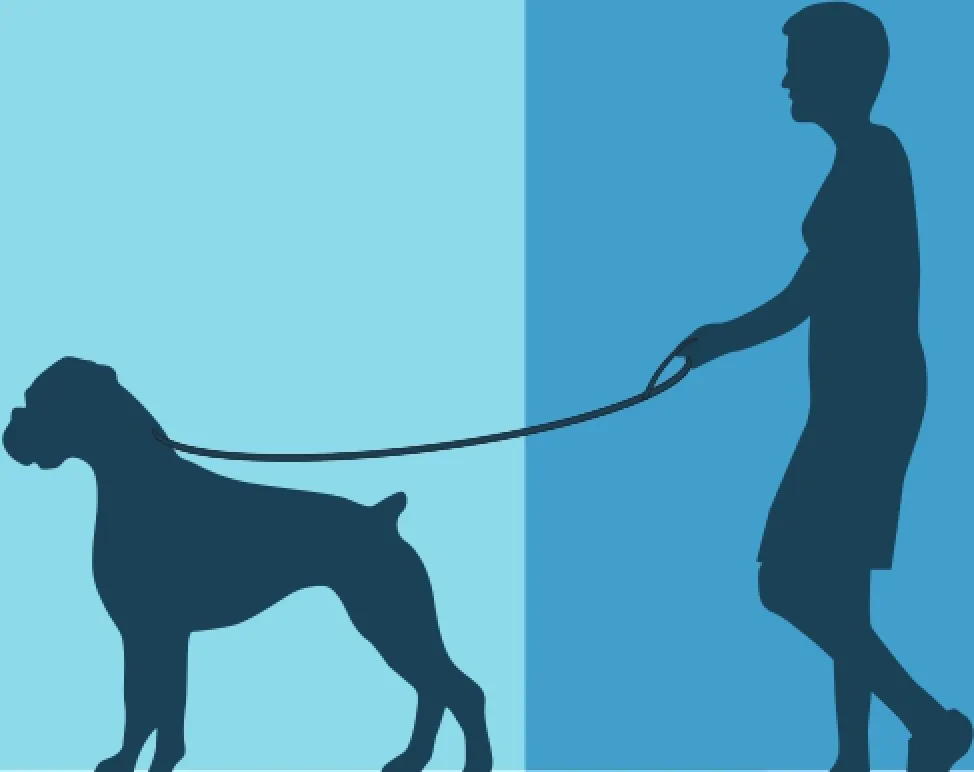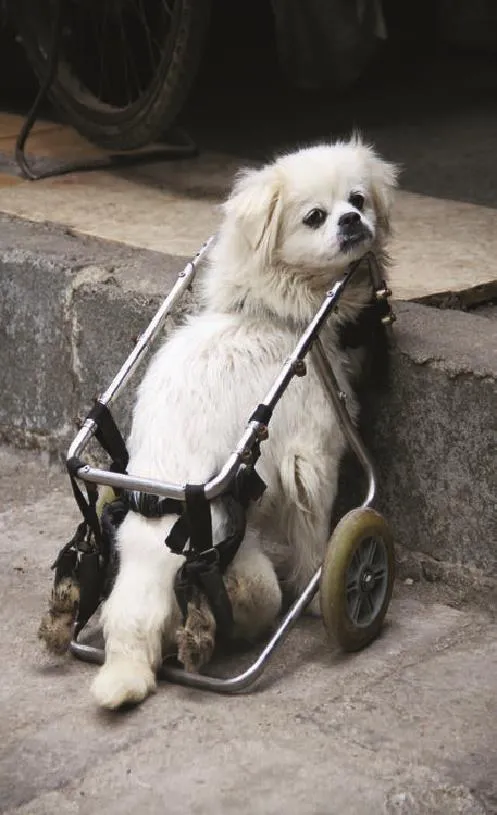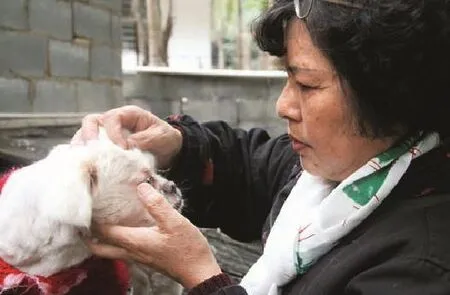ADOG’S LIFE
2015-01-05BYGINGERHUANG黄原竟
BY GINGER HUANG (黄原竟)
ADOG’S LIFE
BY GINGER HUANG (黄原竟)
Pet owners, the government, and the dogs themselves struggle with the responsibilities of pet ownership in the city
宠物是人类的好伙伴,更是一份需要用心对待的责任



When you approach the iron gate of Laifu Yard, located in Dahuichang Village off the west Sixth Ring Road in Beijing, you are greeted by dozens of enthusiastic dogs—some with obvious disabilities—but they all look frantically happy to see any visitor. The gate is reinforced with boards, bars, and locks so that it’s not pushed open by the hyperactive canines. Though most of the dogs here have experienced pain and abandonment, they have no idea that the world outside the gate is still a hostile one. Laifu Yard is in trouble. Founded in 1998 and one of the largest stray dog shelters in Beijing, the 0.4 acre yard now houses around 400 dogs and 200 cats, far beyond capacity. For several years, the villagers have been complaining about the noise and bad smell—quite reasonable considering households are in quite close proximity—and the complaints are coalescing into hatred. This year, the village committee is officially evicting Aunt Li, the founder of the shelter, and her dogs. Most NGOs concerned with stray animal welfare in Beijing, like Laifu Yard, are facing a similar situation: a shortage in funds, hands, and space. They keep moving farther from the city, all while taking on more and more animals from the careless metropolis. In Chinese cities, the pet industry is advancing at a stunning speed. In 1993, there was only one brand of dog food in China, Mars; however, by 2014, the dog-care industry had boomed so rapidly that it is became a 900 million RMB a year venture.
However, much like many other industries, the pet industry is growing staggeringly and grotesquely, causing new problems along the way.
Like anything else, there have been trends in Chinese people’s preference of dog, trends often defined by popular films. Labradors became all the rage on Beijing’s streets in 2004 withQuill, andLassiein 2006 made rough collies popular.Eight Belowmade Alaskan malamutes and huskies the most desired pets for a while, and shiba won the hearts of Chinese people inHachiko: A Dog’s Storyin 2009 (and of course the internet fame of Doge). However, as each trend came and went, Chinese dog owners realized that getting a dog is not exactly like inviting a friendly angel into your home; with each trend saw a new peak in abandonment for that breed.
“Those films are not truthful representations of the dogs,” Angella Zheng, companion animal project officer at the International Fund for Animal Welfare (IFAW), explains. “After the screening ofEight Below, a lot of people were lured into the fantasy that, if they didn’t own such a smart dog, they wouldn’t live the happy life of the film’s protagonist. However, you cannot really live a film. Huskies can howl like a wolf that resounds around the whole block if they are not given proper training. Alaskan malamutes are born to exercise extensively, and when they are confined to the limits of an urbanapartment, their pent up energy may lead to extreme destructiveness.”
Currently, the Bichon Frise-Shih Tzu mix (Shichon) is the preferred breed in China, a small dog also known as a “teddy”.
“Although there have been various trends in the choice of dogs, it’s the first time one single breed has become this popular,” Doctor Yin from the Saijia Animal Hospital says. He has been practicing since 1998 and is one of the most acclaimed vets in Beijing. “Of course the phenomenon has its causes. The Shichon looks cute, and as a descendent of the poodle, it is also very intelligent. It doesn’t shed much hair, it’s small, and it is domestic by nature and doesn’t need to be walked a lot. In this respect, it’s almost perfect for Chinese urban residents in dense communities.”
However, Yin is concerned about the health of the dogs. “It’s a relatively newly-imported breed. Now that it has won Chinese people’s favor, it is multiplying in all Chinese dog breeding farms, but it is hard to tell the risks. It is already showing signs of hereditary diseases. Because of hip defects at birth, a lot of the Shichons I receive here suffer from necrosis of the hip joints. We will need to wait for another 10 or 15 years to see if it develops other hereditary defects.”
“There used to be more mongrel breeds in China,” Yin points out. “However, with the progress of urbanization and the dog breeding business becoming highly commercialized, most people purchase their dogs from markets instead of getting puppies from friends. Mostly, you can only see purebred dogs.”
Purebred dogs tend to have a much higher chance of hereditary diseases due to a lack of genetic diversity and inbreeding, and they are not as healthy as mongrels in general. While this is a fact all over the world, in China the situation is worse. “In China, the dog breeding business is extremely greedy. It is centered on self-interest only, instead of the dogs’ health,” Yin says. “That makes Chinese purebred dogs unhealthier than those abroad.”

A disabled and abandoned dogwith two broken legs walks with the assistance of a device at the Society for the Prevention of Cruelty to Animals in Zhuhai, Guangdong Province, an NGO that adopts and cares for abandoned dogs and cats
In a Chinese dog market, you can find a surprising variety of dogs, but without any regulation on dog breeding and no law to protect the consumers who purchase pets, buyers are taking big risks when they do so. A lot of dog buying tips circulating online are warning buyers against the “one-week puppy”, a worst case scenario that has become all-too common.
In these cases the puppy looks healthy at first—often the effect of antibiotics and anti-inflammatory drug dexamethasone—but will fall seriously ill shortly after the purchase and die in a week. The puppies are often taken from their mothers shortly after their births—unvaccinated, undernourished, and collectively caged. They are often infected with parvo virus or canine distemper virus even before they are sold.
Although many owners put them into immediate treatment, there is almost no hope for recovery. The only safe way to buy a puppy is directly from a responsible breeder, and they can be hard to find.
Companion animal NGOs are trying hard to get people to adopt instead of purchase. Estee is a volunteer in a well-known grassroots animal welfare organization, The Good Dogs and the Good Cats Volunteers (好狗好猫流浪狗义工团). Their Weibo account has around 29 million followers, updating on an hourly basis the latest information about how to find stray dogs and cats, if the animals require immediate treatment and care, and to help spread the message if someone’s dog is lost, and every year they help about 400 stray animals find homes.
Estee and her colleagues try to make sure each new family is qualified to raise a pet, but in many cases, they are definitely not. “A lot of Chinese people romanticize life with a pet. They expect the pet to be like a fluffy toy, only there to please and never disappoint. But that’s impossible.”
When she explains, she speaks in a hurried tone that gives the impression she has explained this too many times. “Adoption means responsibilities. It means you will sacrifice your sleep at night taking care of it when it is ill. It means under no circumstances should you abandon it—getting married, getting pregnant, and moving to another city are not an excuse. You should not entertain expectations that are unreal, such as expecting the pet to be as clever as a human. A dog is a dog; its IQ equals that of a three-year-old at most, and it can never be as smart as the dogs you see in movies. It naturally makes mistakes and causes trouble, and you must be patient with it, just like you should be patient with a three-year-old. These are the basics if you are going to raise a pet.”
While the pet industry is taking off in China, there is almost no education on how to be a responsible dog owner, such as having the dog registered, walking dogs with a leash, cleaning up after them in public, spaying and neutering, and giving them sufficient training so they won’t cause havoc in the neighborhood. Many pet owners follow these basic rules, but there are no regulations forcing other dog owners to follow suit; the result is obvious to anyone who has set foot on grass in places like Beijing, where dog mess is a regular hazard and dogs are left to run wild. In 2014, the number of incidents of dog bites was reported to be 14 times higher than traffic accidents, and for the past 10 years, the number of people dying from rabies has been on the rise in China, reaching a historic peak in 2006 of 3,279 people. For a little perspective, the US has a handful of cases a year (usually from abroad), and the last person to die of rabies in the UK died in 2012.
The responses of local governments to dogrelated problems have sometimes made the situation worse. In most Chinese cities, the local government outlaws dogs over 35 centimeters (byshoulder height) in metropolitan areas. This means that even large-sized dogs like the Labrador and the Golden Retriever, known for their mild and friendly nature, would be illegal. In Beijing, 2003 regulations gave police the right to take away dogs by force if the dog is larger than allowed, not registered, or if it is reported to be a risk to other people’s safety.
This has caused numerous controversies with owners of large dogs. Beijing dog forums are always in a terror during May and June every year, because “dog arrests” usually occur in this period. Dog owners warn each other of locations where they see police cars with dog cages, share their experiences with the police, and urge large dog owners to send their dogs to the suburbs just to be safe or at least walk them before six in the morning or after 12 at night. The dog owners proclaim: “I’ll keep my dog as long as I live,” and “They can take my dog only by stepping over my dead body.”However, despite all the protests, dog owners are powerless against these regulations. If a small dog is arrested for not being registered, the owner can still pay a fine and get it back; with a Labrador, Golden Retriever, or Husky, however, once it is taken away by the police, the owner will never see it again.
While animal welfare organizations are petitioning for more humane methods of dog management, the advice from Zheng is that, one should not have pets that don’t meet the regulations. “Admittedly, the regulations are not reasonable. However, now that it is enacted, as a citizen you should abide by it. A dog can live over 10 years, and you should be responsible when you make the decision to raise it. If it is arrested, your irresponsibility caused it.”
Other than the limit on dog sizes, the current regulations are not resulting in people becoming less responsible dog owners, which for Zheng is the more contentious issue. “When a dog is unleashed, it can harm other people no matter the size. The real issue here is that regulations should make dog owners more responsible. A lot of media attention is focused on the problems between dog owners and non-dog owners, but actually, that misses the point,” she says. “The true problem is that irresponsible dog owners are at war with society. The fines and punishments should be applied to them, as well as in cases of animal abuse, instead of punishing the dogs themselves. After all, it’s dog owners who should be responsible for dogs, not dogs for their owners.”
“Our media paints an unrealistic picture of keeping a dog—you get a companion, happiness, and love,”Zheng points out. “That’s why we are trying to spread the message that raising a dog means a long-term commitment. You need to train it, take care of it when it gets sick, and pay large medical expenses. It’s not just about getting a dog, it’s more about giving. If you are not ready for that, please reconsider.”
With the one-child policy having been practiced for decades and with urbanization transforming lifestyles in China’s cities, animals are more important than ever to urban Chinese people. However, the Middle Kingdom has a long way to go before it is a safe and happy place for the best companion mankind has ever had.

A volunteer picks fleasfrom an abandoned dog with a missing eye at an animal protection NGO
